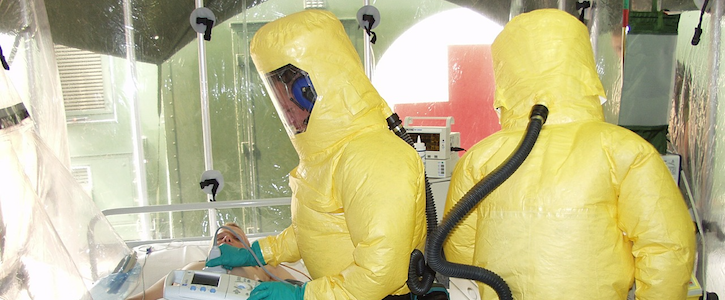FDA Allows Emergency Use of First Rapid, Portable Ebola Test
The portable reader enables the test to deliver diagnostic results where patients are, leveraging data to jumpstart care in Ebola-stricken areas.

The U.S. Food and Drug Administration (FDA) has authorized the emergency use of the first rapid, single-use Ebola virus test that is portable and battery-operated, despite it not yet having earned regulatory approval, according to the agency.
Although it is the second FDA-authorized rapid antigen fingerstick test, the assessment — the DPP Ebola Antigen System — is expected to speed up healthcare delivery in the areas where it’s most needed. The FDA said today the test provides “clear diagnostic results” not in the lab, but rather where patients are already receiving treatment, leveraging data to streamline care in vulnerable populations.
>> READ: Why Cellphones Might Be the Next Great Public Health Tool
“This (emergency use authorization) EUA is part of the agency’s ongoing efforts to help mitigate potential future threats by making medical products that have the potential to prevent, diagnose or treat available as quickly as possible,” FDA Commissioner Scott Gottlieb, M.D., said in a statement.
DPP Ebola Antigen System uses blood specimens from patients who are showing signs and symptoms of Ebola virus disease and who live in an area with many cases or have had contact with suspected patients with Ebola, according to the FDA. The test should be run only in clinics and treatment centers.
The technology shows promise for controlling smaller Ebola outbreaks that have lingered in the wake of the major outbreak in West Africa in 2014. Recent outbreaks have continued to crop up in remote places with “limited resources,” particularly in the Democratic Republic of Congo (DRC), and an emergency declaration persists, according to the FDA.
“By authorizing the first fingerstick test with a portable reader, we hope to better arm healthcare providers in the field to more quickly detect the virus in patients and improve patient outcomes,” Gottlieb said.
The FDA may grant emergency use authorizations to medical products that are unapproved across the board or for a specific use, provided there is no other approved alternative. Regulators make the decision based on evidence suggesting the device is effective and its benefits outweigh potential risks.
Get the best insights in healthcare analytics directly to your inbox.
Related
This Portable, Clunky Visor Could Change Stroke Diagnoses and Save Lives
Telemedical Drones Are Increasing Access to Care in the Face of Natural Disasters
The Numbers Behind the First FDA-Approved Autonomous AI Diagnostic System